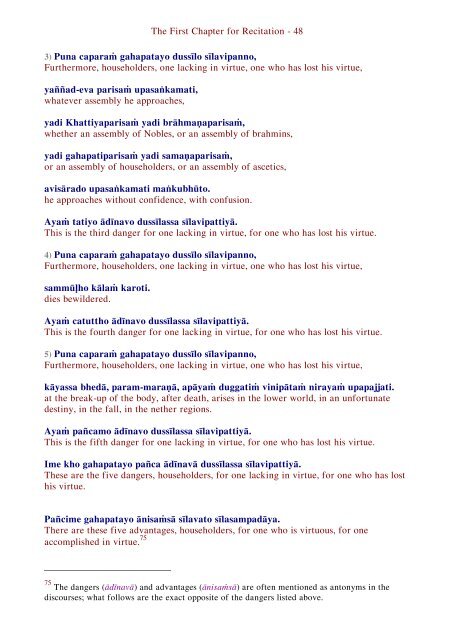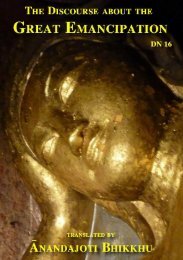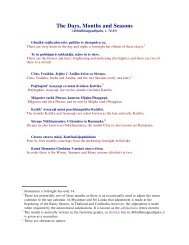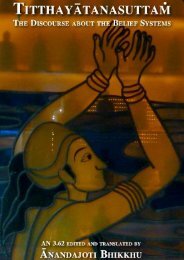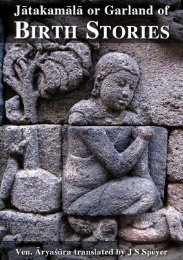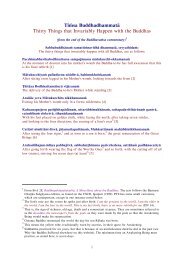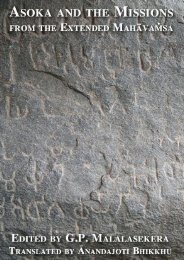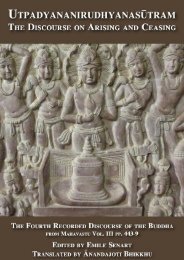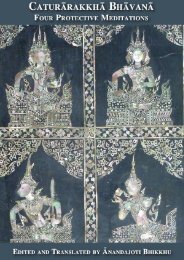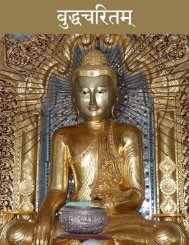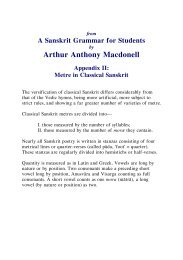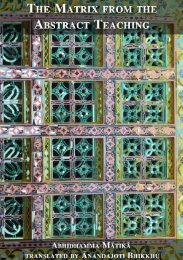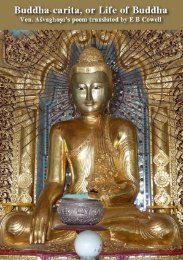Mahaparinibbanasuttam (DN 16) - Ancient Buddhist Texts
Mahaparinibbanasuttam (DN 16) - Ancient Buddhist Texts
Mahaparinibbanasuttam (DN 16) - Ancient Buddhist Texts
Create successful ePaper yourself
Turn your PDF publications into a flip-book with our unique Google optimized e-Paper software.
The First Chapter for Recitation - 48<br />
3) Puna caparaṁ gahapatayo dussīlo sīlavipanno,<br />
Furthermore, householders, one lacking in virtue, one who has lost his virtue,<br />
yaññad-eva parisaṁ upasaṅkamati,<br />
whatever assembly he approaches,<br />
yadi Khattiyaparisaṁ yadi brāhmaṇaparisaṁ,<br />
whether an assembly of Nobles, or an assembly of brahmins,<br />
yadi gahapatiparisaṁ yadi samaṇaparisaṁ,<br />
or an assembly of householders, or an assembly of ascetics,<br />
avisārado upasaṅkamati maṅkubhūto.<br />
he approaches without confidence, with confusion.<br />
Ayaṁ tatiyo ādīnavo dussīlassa sīlavipattiyā.<br />
This is the third danger for one lacking in virtue, for one who has lost his virtue.<br />
4) Puna caparaṁ gahapatayo dussīlo sīlavipanno,<br />
Furthermore, householders, one lacking in virtue, one who has lost his virtue,<br />
sammūḷho kālaṁ karoti.<br />
dies bewildered.<br />
Ayaṁ catuttho ādīnavo dussīlassa sīlavipattiyā.<br />
This is the fourth danger for one lacking in virtue, for one who has lost his virtue.<br />
5) Puna caparaṁ gahapatayo dussīlo sīlavipanno,<br />
Furthermore, householders, one lacking in virtue, one who has lost his virtue,<br />
kāyassa bhedā, param-maraṇā, apāyaṁ duggatiṁ vinipātaṁ nirayaṁ upapajjati.<br />
at the break-up of the body, after death, arises in the lower world, in an unfortunate<br />
destiny, in the fall, in the nether regions.<br />
Ayaṁ pañcamo ādīnavo dussīlassa sīlavipattiyā.<br />
This is the fifth danger for one lacking in virtue, for one who has lost his virtue.<br />
Ime kho gahapatayo pañca ādīnavā dussīlassa sīlavipattiyā.<br />
These are the five dangers, householders, for one lacking in virtue, for one who has lost<br />
his virtue.<br />
Pañcime gahapatayo ānisaṁsā sīlavato sīlasampadāya.<br />
There are these five advantages, householders, for one who is virtuous, for one<br />
accomplished in virtue. 75<br />
75 The dangers (ādīnavā) and advantages (ānisaṁsā) are often mentioned as antonyms in the<br />
discourses; what follows are the exact opposite of the dangers listed above.


